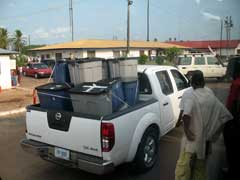
Leading a STM Medical Team
Early Pre-Trip Tasks
Budget

The greater part of the cost is generally the air travel expense. Other costs include housing, food, ground transportation,
translators, ministry costs (medicines, evangelism tools, health education tools, puppet ministry, crafts, etc.), and
miscellaneous. Sources of income are the fees paid by participants (or their supporters), funds allocated to the trip by the
sending organization, and funds donated for the benefit of the trip by outside donors.
Travel costs: With internet search capabilities (our favorite is this
site: Kayak) one can get a very
close approximation of the final cost of air travel at a very early stage of planning.
As a travel agent (we have used
Fellowship Travel with good
success) is brought into the planning the costs become more focused.
Many countries require a cash payment to depart the country back to the USA. It
can be called an exit or airport tax. Some countries require exact cash payment while others allow credit card payment. Some
include the "tax" in the airfare paid to the airline. It is good to get clarification on all these points. Some countries require a
Visa before entry is allowed. These can be expensive. Rules for individual countries can be found at the
US State Dept web site. Be sure
to plan on getting a Visa well ahead of the departure date to allow sufficient time for the process.
Excess baggage charges for a large group can be quite high. It is good to verify rules which will apply to your group
as early as possible in the planning process. Other possible expenses to discuss with the travel agent are Airline Cancellation
fees and Travel Insurance. See the link below for an example of a low-cost policy we have often used.
As you work with the national host, the in-country costs will become clear. It is very important to be specific - day by day and
meal by meal - about who pays for what. Our preference is to have the host organization pay all costs in-country with reimbursement by
the sending organization. Usually a large deposit is required with the host organization prior to the trip with the balance due upon completion.
It is important to verify that the costs for meals, housing, transportation, translators, and security are fixed ahead of time (often by
negotiation). Once you are in the field it is very difficult to know what the "market" rate is for different services.
Most often the retreat/debrief time falls outside the scope of what the national host provides. They might be able to help locate a
retreat location in-country, but generally you negotiate prices for room and board with the retreat location separately. Early clarification on this
point prevents problems later.
The medical and nursing directors can help develop a list of medical supplies (some essential, some desired
but not essential). Raising support for this amount is the way many teams fund this portion of the budget. It is common for the sending organization
to host a celebration dinner for the nationals with whom they have worked.
As the weeks pass from the first thoughts about a trip to its completion the budget moves from general ideas to very specific amounts. At some point
you will need to tell the team what the cost to them will be, generally at or near the first team meeting. At an even earlier date, during recruitment,
you will need
to give people an idea about the estimated cost. We have taken the position to estimate high so people are pleasantly surprised when you "save" them a
few hundred dollars.
Downloads and links available:
| «Previous Page | Next Page» |